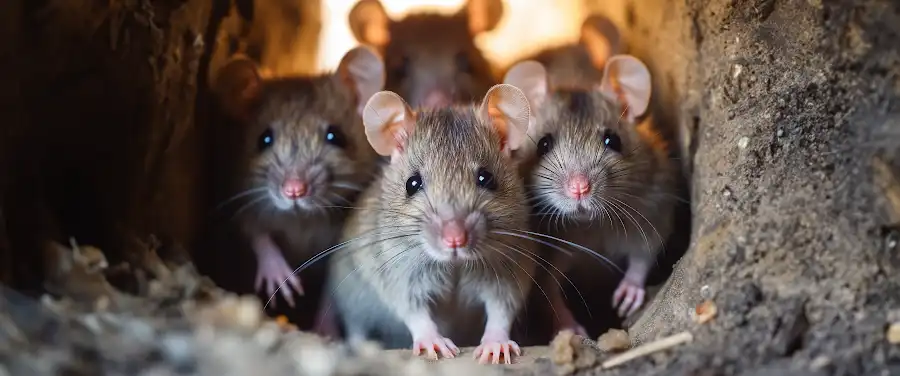
We were all kids once, fascinated by those cute, little, furry creatures scurrying around in the yard or park, weren’t we? Rodents, they’re called. Some find them cute, others shiver at the thought, but we all need to be wary. Rodents may seem harmless at first sight, but those jaw-dropping rodent facts you used to google as a kid, they didn’t give you the full picture. Beneath the fur-crowned, whiskered faces lurk invisible threats that can jeopardize human health. This might sound like a thrilling spy novel, but it’s an undeniable reality we must confront.
Let’s say you step into your kitchen one day, only to find crumbs scattered everywhere, and realize that those tiny mischief-makers have been gnawing away at your stored food. Adorable? Maybe. Sanitary? Definitely not. You see, our whisker-faced ‘friends’ are nothing less than vectors of certain zoonotic diseases, illnesses transferred from animals to humans. What you might see as innocent afternoon merriment might actually be laying the groundwork for potentially severe health problems.
Understanding these unseen hazards that creep alongside rodents is not an option, it’s a necessity. You might be wondering why this sudden lesson in ‘Mouseology’. Well, we believe in the saying, ‘knowledge is power’, and this power can be your shield against the health risks associated with rodents. But before we dive deep into the world of rodents, remember, having knowledge is one thing, but acting upon it is another. Every tale has a beginning, and ours starts with understanding the common types of rodents found in urban areas. So, buckle up for a furry, astonishing yet significant ride through Rodentville.
What Kind of Diseases Can Rodents Spread?

When we think about rodents like rats, mice, or squirrels, we probably don’t immediately associate them with danger. However, these little intruders can cause some serious health risks. It turns out, rodents are carriers of zoonotic diseases—illnesses that can be transmitted from animals to humans. From Hantavirus Pulmonary Syndrome to Leptospirosis and Rat-Bite Fever, the list of diseases associated with these small animals is surprisingly long.
Zoonotic Diseases
Zoonotic diseases are infections that can be transferred between animals and humans. Often, these diseases aren’t necessarily life-threatening for the rodents themselves, but they can cause serious illness in humans. They might be spread by direct contact with the animal, through their droppings, or by a vector—an animal (usually an insect) that transmits the disease without becoming ill itself.
Hantavirus Pulmonary Syndrome
A severe respiratory disease that can be contracted from the droppings, urine or saliva of some types of rodents, primarily the deer mouse.
Leptospira
The bacteria that causes Leptospirosis, can also be found in rodent urine. People often contract the infection indirectly by coming into contact with contaminated water or soil.
Rat-Bite Fever
Rat-Bite Fever, on the other hand, is typically the result of a direct bite or scratch from a rat or mouse.
Salmonellosis and Tularemia
But it doesn’t end there. Rats and mice can also transmit Salmonellosis, a bacterial disease affecting the intestinal tract usually contracted from contaminated food or water. We’ve also got Tularemia, a highly infectious and lethal disease caused by the bacterium Francisella tularensis, which, you guessed it, can be contracted from close contact with rodents.
According to the Center for Disease Control and Prevention, there are many other diseases rodents can transmit, signaling the severity of the health risk associated with these seemingly harmless creatures.
| Disease | Mode of Transmission |
|---|---|
| Hantavirus Pulmonary Syndrome | Contaminated droppings, urine or saliva |
| Leptospirosis | Rodent urine, Contaminated water or soil |
| Rat-Bite Fever | Direct bite or scratch from a rodent |
| Salmonellosis | Contaminated food or water |
| Tularemia | Direct contact with an infected rodent |
How Do Rodents Transmit Diseases to Humans?

Understanding how rodents transmit diseases to humans is crucial to safeguarding our health. Crossing paths with rodents may be common, but there are particular instances where disease transmission becomes more likely.
Rodents can directly transmit diseases through bites and scratches. However, the most common transmissions occur indirectly. This can happen when people unintentionally come into contact with rodent feces, urine, or the ticks, mites or fleas that have bitten an infected rodent.
Together, the acknowledgment of these detrimental diseases and a deep understanding of their transmission modes form a formidable defense against the health risks associated with rodents. As prevention is always better than cure, stay clean and keep your surroundings free from any possible rodent habitats.
In our next discussion, we will continue to unfold the alarming long-term health effects of diseases carried by rodents. Stick around, as this could be your stepping stone to a safer, healthier living environment.
What are the long-term health effects of diseases carried by rodents?

Ever heard the saying “A little mouse won’t harm anyone”? Unfortunately, that couldn’t be further from the truth. Rodents, as modest and harmless as they may appear, can turn your healthy life upside-down. After all, they are known carriers of several chronic diseases that can seriously impact your health. Let’s take a moment to grasp the gravity of these long-term health effects.
First and foremost, the Hantavirus carried by rodents is a severe and sometimes fatal respiratory disease that humans can contract when exposed to rodent droppings, urine, or saliva. If left untreated, it can lead to chronic respiratory issues and kidney failure.
Next up is the notorious Lyme disease, transmitted by ticks that have fed on infected rodents. If not addressed promptly, this illness can progress to the joints, heart, and the nervous system, causing persistent health issues such as arthritis, cardiac abnormalities, and neurological problems.
According to the Centers for Disease Control and Prevention (CDC), about 300,000 people are diagnosed with Lyme disease in the US every year, emphasizing the colossal health impact of rodents.
Can these diseases be fatal?
Absolutely, these rodent-borne diseases can indeed be lethal. The gravity of health risks depends on various factors such as the specific disease, its severity, the individual’s health, and the timeliness of treatment.
Leptospirosis, for instance, another rodent-borne disease, may lead to kidney damage, meningitis (inflammation of the membrane around the brain and spinal cord), liver failure, and respiratory distress if not treated promptly, painting a dire picture of disease fatality.
Hantavirus Pulmonary Syndrome (HPS) also underscores the potential lethality of diseases carried by rodents. The CDC reports a mortality rate of approximately 38% for individuals diagnosed with HPS, confirming the real dangers of rodent-induced health risks.
In the intricate web of life, even creatures as small as rodents can pose significant challenges to our health. By understanding these risks and taking proactive measures, we can better protect ourselves and our families. The next step in doing so? Learning how to identify a rodent infestation in your home. Stay tuned.
Conclusion
Rodents – the mere mention of this term might provoke an instant reaction of revulsion or fear in many people. But beyond their reputation as unwanted invaders in our homes, rodents pose serious health threats that are often overlooked. The health risks associated with rodents are extensive, causing diseases that can prove fatal if not treated promptly.
You may ask, “What’s the big deal?” After all, a tiny mouse or rat might seem more annoying than perilous. But here’s the alarming reality: rodents are carriers of more than 35 diseases that can infect humans. These include potentially dangerous infections like Hantavirus, Salmonellosis, and Plague, to name a few. Their harmful impact doesn’t just halt at creating unsanitary conditions; they can disrupt the tranquillity of your home and jeopardize your health in more ways than one.
When we think of rodents transmitting diseases, we often picture a direct contact scenario – like a bite or scratch. While these incidents can indeed lead to serious infections, you need to know that these aren’t the only routes of transmission. Indirect contact through ticks, fleas, or mites that have fed on an infected rodent is a common transmission method. Furthermore, simple contact with rodent urine, feces or saliva can also lead to disease. Disturbingly, even inhaling dust that’s been contaminated with these can make you sick!
The risks go beyond disease transmission. Rodents are known for their gnawing habits. They can chew through your household materials, causing potential fire hazards by gnawing on electrical wiring. Needless to say, such situations can lead to calamitous outcomes.
Despite their small size, rodents can have a colossal impact on public health and domestic tranquility. As such, it’s critical to take steps to prevent these small invaders from becoming a big problem in your home. Regular cleaning, sealing off potential entry points, and timely pest control measures can prove crucial in keeping these pests at bay.
Understanding the health risks associated with rodents can protect you and your loved ones from potential dangers. Remember: A rodent-free home is not just a tidy home. It’s also a safer and healthier one.
| Health Impact | Associated Cost |
|---|---|
| Direct Touch | Hantavirus Pulmonary Syndrome, Hemorrhagic Fever with Renal Syndrome |
| Indirect Touch | Plague, Tularemia |
| Fecal or Urine Exposure | Salmonellosis, Leptospirosis |
| Structural Damage | Fire Hazards, Property Damage |
So the next time you spot a rodent in your vicinity, remember, it’s not just about an unwanted presence; it’s about your health at stake. The smaller they are, the bigger the health risk they carry.
**_Remember – Prevention is always better than a cure!_**
So let’s stay informed, stay safe, and say no to rodents!
This information is significant for anyone, irrespective of whether you live in a high-end locality or a downtown apartment. After all, rodents do not distinguish between boundaries, and neither do the diseases they carry.




